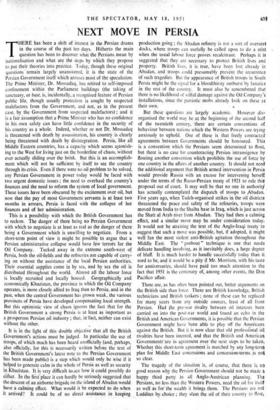NEXT MOVE IN PERSIA
THERE has been a shift of interest in the Persian drama in the course of the past ten days. Hitherto the main question has been to discover what the Persians mean by nationalisation and what are the steps by which they propose to put their theories into prdctice. Today, though these original questions . remain largely unanswered, it is the state of the Persian Government itself which arouses most of the speculation. The Prime Minister, Dr. Mossadaq, has retired to self-imposed confinement within the Parliament buildings (the taking of sanctuary. or bast, is, incidentally, a recognised feature of Persian public life, though usually protection is sought by suspected malefactors from the Government, and not, as in the present case, by, assumption Government from suspected malefactors) ; and it is a fair assumption that a Prime Minister who has no confidence in his own safety can have little confidence in the security of his country as a whole. Indeed, whether or not Dr. Mossadaq is threatened with death by assassination, his country is clearly being threatened with death by disintegration. Persia, like all Middle Eastern countries, has a capacity which seems astonish- ing to the West for living just on the borderline of chaos, without ever actually sliding over the brink. But this is an accomplish- ment which will not be sufficient by itself to see the country through its crisis. Even if there were no oil problem to be solved, any Persian Government in power today would be faced with two urgent domestic issues ; the need to overhaul the country's finances and the need to reform the system of local government. These issues have been obscured by the excitement over oil, but now that the pay of most Government servants is at least two months in arrears; Persia is faced with the collapse of her finances and of her administration.
This is a possibility with which the British Government has to reckon. The danger of there being no Persian Government with which to negotiate is at least as real as the danger of there being a Government which is unwilling to negotiate. From a short-term point of view it might be possible to argue that a Persian administrative collapse would have few 'terrors for the Oil Company. Tucked away in the extreme south-west of Persia, both the oil-fields and the refineries are capable of Carry- ing on without the assistance of the local Persian authorities. Their essential supplies come in by sea, and by 'sea the oil is distributed thioughout the world. Almost all the labour force is locally recruited and locally housed. Geographically and economically Khuzistan, the province in which the Oil Company operates, is more closely allied to Iraq than to Persia, and in the past, when the central Government has grown weak, the various provinces of Persia have developed compensating local strength.
But this optimistic view of chaos ignores the fact that for the British Government a strong Persia is at least as important as a prosperous Persian oil industry ; that, iniact, neither can exist without the other. .
It is in the light of this double objective that all the British Government's actions must be judged. In particular the use of troops, of which much has been heard unofficially (and, perhaps, also officially, for this is necessarily written before the text of the British Government's latest note to the Persian Government has been made public) is a step which would only be wise if it helped to generate calm in the whole of Persia as well as security in Khuzistan. It is very difficult tosee how it could possibly do either. In the fiist'place it can hardly be seriously suggested-that the descent of an airborne brigade on the island of Abadan.weuld have a calming effect. What would it be expected to do when it arrived? It could be of no direct assistance in keeping production going ; the Abadan refinery is not a sort of overseas . docks, where troops can usefully be called upon to do a stint when the usual labour force proves recalcitrant. Perhaps it is suggested that they are necessary to protect British lives and property. British lives, it is true, have been lost already in Abadan, and troops could presumably prevent the recurrence of such tragedies. But the appearance of British troops in South Persia might be the signal for a bloodthirsty outburst by fanatics in the rest of the country. It must also be remembered that there is no likelihood of wilful damage against the Oil Company's installations, since the patriotic mobs already look on these as their own.
But these questions are largely academic. However dis. organised the world may be at the beginning of the second halt of the twentieth century, there are certain conventions of behaviour between nations which the Western Powers arc trying anxiously to uphold. One of these is that freely contracted agreements between Governments should be honoured. This is a convention which the Persians seem determined to flout, but there is no case for counteracting Persian intransigence by flouting another convention which prohibits the use of force by one country in the affairs of another country. It should not need the additional argument that British armed intervention in Persia would provide Russia with an excuse for intervening herself under the terms of the Russo-Persian treaty of 1921 to rule thit proposal out of court. It may well be that no one in authoritl has actually contemplated the dispatch of troops to Abadan. Five years ago, when Tudeh-organised strikes in the oil districts threatened the peace and safety of the refineries, troops were moved from India to the Shaiba base in Iraq, which is just across the Shatt al Arab river from Abadan. They had then a calming effect, and a similar move may be under consideration today. It would not be straining the text of the Anglo-Iraqi treaty to .suggest that such a move was possible. but, if adopted, it might well fan the most violent anti-British agitation throughout the Middle East. The " gunboat " technique is one that needs delicate handling involving, as it inevitably does, a large degree of bluff. It is much harder to handle successfully today than it used to be, and it would be a pity if Mr. Morrison, with his taste for anniversaries, should have paid too much attention to the fact that 1951 is the centenary of, among other events, the Don Pacifico affair.
There are, as has often been pointed out, better arguments on the British side than force. There are British knowledge, British technicians and British tankers ; none of these can be replaced for many years from any outside sources, least of all from Persian. Had the pre-war rivalry between oil interests been carried on into the post-war world and found an echo in the British and American Governments, it is possible that the Persian Government might have been able to play off the Americans against the British. But it is now clear that old professiOnal oil rivalries have been interred. and that the British and American Governments' are in agreement over the next steps to be taken. Whether this short-term agreement is matched by any long-term plan for Middle East concessions and concession-terms is not so clear.
The tragedy of the situation is, of course, that there is no good reason why the Persian Government should not be made. a happy third party in all Anglo-American planning. The Persians, no less than the Western Powers, need the oil for itself as well as for" the wealth it brings them. The Persians are not Luddites by choice ; they Want the oil of their country to flow. It is true that their present conduct is much more likely to stop it up than to circulate it, but the efforts of the British Govern- . ment must still be directed to making them see this, and not risk driving them further into obstinacy. The Persian Government have so far refused to arbitrate or even to negotiate. There is always the chance that facts may compel them to do the latter, even if they call their performance by some other name. As a last resort there is always the United Nations. Recourse to that body would take time, and in a straight vote Persia would he certain to win an uncomfortable measure of support, so popular through the world are the simplicities of nationalism. But at Lake Success there are also opportunities for face-saving, com- promises and second thoughts. Any of these would be useful at any time.







































 Previous page
Previous page